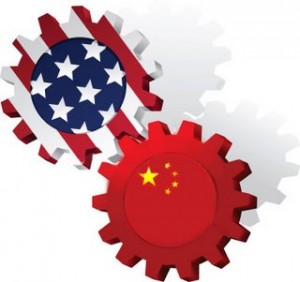Americans, the rich and the poor, often talk about how China’s growing economy will soon surpass that of America and how US will lose the economic competition.
As this article by Christopher Matthews points out, President Obama often uses the language of competition (using examples of South Korea and China) to talk about how America should invest more in education and other areas in order to be more competitive.
So is economics about competition? We often measure a country’s production of total value of goods and service by GDP. According to Google, as of 2012, GDP for US is 15.68 trillion dollars and 8.227 trillion dollars for China.
Although US GDP is higher than that of China right now, many experts predict that the size of China’s economy will surpass that of US soon. Although there are some arguments about when it will (some say by 2016 or 2028 due to difficulty of comparing different countries’ economies with different currencies with different purchasing power), no one cannot deny the fact that China has a fast growing economy.
Going back to the question of competition, is economics really about competition? Many argue that it is and that we should try to maintain the higher GDP. However, can we think about it in a different way? How about economics being about collaboration as Chris points out in the article? From our previous economics courses, we learned that if another country’s economy grows then there will be a bigger market for goods and services that we can create in the US. This might be controversial but if we can collaborate, then certainly, both of the countries’ economies will grow.
Further reading: Business Times article, US GDP, Chinese GDP, US-China comparisons
I don’t believe that economics is about competition, but rather a gauge of two country’s economic statuses. Although China’s economy has been growing quicker than the U.S. in the past few decades, I believe that labor productivity and the law of diminishing returns should be accounted for. I foresee China’s economy plateauing in the next decade. However, if their economy does continue grow at this rate, by the laws of comparative advantage, the U.S.’s economy will grow simultaneously.
I also agree with you on the idea that economics is not about competition.
Although many people think that higher GDP or bigger economy has many advantages (and sometimes it works that way), the synergy of collaboration has bigger and positive impact on both countries’ economies.
Regardless of whether economics is about competition or not the real question that needs to be asked is if China’s growth is correlated with United States growth. Of course growth begets growth and as markets grow more opportunities are created. However, there are also economic problems that the U.S. may have to worry about in regards to China such as military development in the Pacific and conflicting ideologies (which have been fought in dollars since world war 2). The competition that really exists isn’t the size of the economy (one would hope China’s GDP would eventually surpass the U.S. having a billion more people) but the trade deficit.
Competition does play a role in the economy but only in a limited manner. The American moral that once boasted to clearly be the best at everything has passed. We are now trying to revamp this old mantra to motivate the economy. I don’t believe that this is extremely effective, but at the same time it is foolish to simply ignore competition totally. For example, unemployment is universally thought of as a bad thing but at the same time, when there are hundreds of people waiting to do your job better than you and for less money, the motivation to work increases. Competition certainly plays a role, but not a huge one.
I agree with Paul. I think the most concerning issue about the ‘competition’ between the US and China isn’t the fact that China’s GDP will soon pass that of the United States, but rather, as we touched on in class the other day, that the Chinese aren’t buying very many American goods. This trade deficit combined with China’s recent military buildup creates an interesting and frightening problem for the US in the near future.
Four words: “Law of Comparative Advantage” — can we use that to reframe the discussion?
There are macro interactions. For an analysis, see the “spillover” studies of the IMF. An example:
Ahuja, Ashvin and Nabar, Malhar (2012). “Investment-Led Growth in China: Global Spillovers.” IMF. Working Paper No. 12/267.